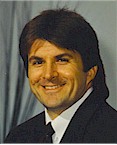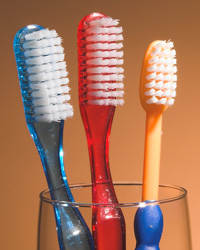Self-Care Toothbrush Tips for Special Needs
Maintaining good oral hygiene can be a challenge, especially if you have developed a health condition that makes brushing and flossing more difficult, or have been in an accident that created new limitations. Dental professionals want to help all dental patients keep their mouths healthy, and they offer these suggestions about oral hygiene.
Dental Brushing Tips
Problems in hands, wrists, arms, and shoulders can hinder a person's ability to brush and floss. While each situation is different, there are some suggestions that have been effective in making dental care easier:
- Use a wide elastic band to attach the toothbrush to your hand for extra gripping power.
- Attach a small rubber ball, a sponge, or a rubber grip to the toothbrush handle with strong tape. This enhances gripping power and is often useful when hand or arm movement is weakened or limited.
- Use a longer wooden dowel, a ruler, or plastic rod to lengthen the toothbrush handle, wrapping it securely with strong tape. This longer length may help in more easily reaching your mouth.
- Use an electric or sonic toothbrush.
Dental Flossing Tips
If limitations make brushing and oral hygiene harder, flossing may be an even bigger challenge. Depending on your limitations, try these techniques:
- Use a piece of floss, about 18" long, and wind one end of floss around each finger instead of holding it. This will increase your grip and prevent the floss from dropping out of your fingers with each tooth you floss.
- Hold the floss tightly and seesaw it back and forth between the teeth, instead of pushing the floss right through.
- Tie the floss into a long circle instead of using one long piece, which may make it easier to hold and less likely to drop from your hands.
- Try using a floss holder, available wherever oral hygiene products are sold.
By Danine M. Fresch, DDS

+Jim Du Molin is a leading Internet search expert helping individuals and families connect with the right dentist in their area. Visit his author page.
Every Mouth Is Different: Oral Hygiene Tailored to You!
No two of us are alike. We all have our own smiles, speech patterns, eye and hair colorings. But we're just now beginning to learn how unique our mouth environments really are. Turns out, they're as distinctively different as fingerprints.
One patient can go a year between checkups, while another might need to return as often as every six weeks for teeth cleaning. The difference? The unique bacterial/chemical mix of each person's mouth. Professionally we call these differences "individualization."
Tartar builders, cavity creators
"Individualization" accounts for the fact that some mouths are genetically and chemically programmed to create tartar buildups, while others barely produce tartar at all. These genetic "signatures" even extend to tooth decay. There are patients who - despite their best efforts - appear cavity susceptible.
Older patients, special needs
Mouths, like people, are affected by years as well as by genes. If you're over 60, your oral chemistry is changing - and thorough examinations of gums and salivary glands can be a lifesaving early detector of oral cancer or other disease.
Patients over 55 develop twice as many cavities as children do. Many times that's because medications seniors take reduce saliva flow and dry the mouth - an open invitation for tooth decay and periodontal disease.
What should you expect from a visit to your dental hygienist? Along with your dental cleaning you may need professional scaling and root planing to remove harmful plaque and calculus deposits. He or she may also record the depths of your periodontal pockets (that space between your teeth and gums where decay and periodontal disease flourish).
Keeping track of you is a key part of the hygienist's job. It includes keeping your dental chart and health history current, making preliminary oral inspections, and creating tooth impressions.
Your hygienist is also an educator - someone who can teach you preventive dentistry skills - brushing and flossing techniques that make for healthy, trouble-free gums and teeth. Together, you two can make an unbeatable team!

+Jim Du Molin is a leading Internet search expert helping individuals and families connect with the right dentist in their area. Visit his author page.










